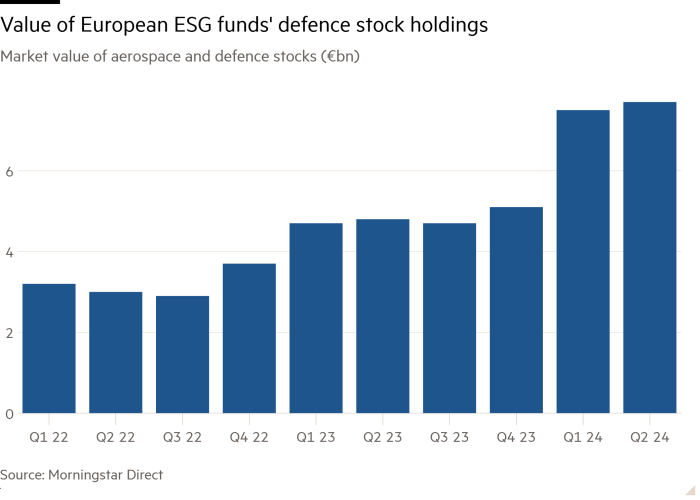
This article is an on-site version of our FirstFT newsletter. Subscribers can sign up to our Asia, Europe/Africa or Americas edition to receive the newsletter every weekday. Explore all of our newsletters here
Good morning. We have updates on the war in Ukraine and from Israel, where the bodies of six hostages were returned from Gaza.
But first, we turn to Germany, where Chancellor Olaf Scholz’s governing coalition has just received a drubbing after the Alternative for Germany party won state elections over the weekend.
According to preliminary results, the AfD garnered 32.8 per cent in Thuringia, way ahead of all other parties. The centre-right Christian Democratic Union was in second place with 23.6 per cent. In the neighbouring state of Saxony, projections by public broadcaster ZDF put the two parties neck and neck, with the CDU projected to win 31.9 per cent and the AfD to come second with 30.6 per cent.
Despite its stunning performance, the AfD will not be able to form a government in Thuringia. Since no other party will co-operate with it, it will not have the parliamentary majority needed to rule.
Nevertheless, the results show many in the country’s formerly communist east are deeply disillusioned with the mainstream parties of the centre and frustrated with the way Germany is run. Tino Chrupalla, the AfD’s co-leader, who described the outcome as “sensational”, said: “One thing is clear: the will of the voters is that there should be political change.”
Here’s more from yesterday’s regional election results, the first time a far-right party has secured victory in a state poll in the country’s postwar history.
-
Analysis: The results show that 34 years after reunification, divisions between the country’s east and west seem to be as deep as ever.
Here’s what else I’m keeping tabs on today:
-
Economic data: The UK, EU, Netherlands, Italy, Germany and Russia have manufacturing purchasing managers’ indices.
-
UK politics: Parliament returns after its shortest summer recess in decades with a “packed legislative agenda”, while former ministers Kemi Badenoch and James Cleverly will launch their bids to lead the Conservative party.
-
Bled Strategic Forum: The annual conference held in the resort town kicks off with a panel discussion among the prime ministers of Slovenia, Croatia, Albania and Serbia on the EU’s changing role.
-
Markets closed: The US and Canada mark Labor Day.
Thank you for all the questions you’ve submitted so far, ranging from Nvidia, to the US presidential race to how we write this newsletter. We’re looking forward to answering as many as possible in a special weekend edition of FirstFT. Please keep them coming: hit “reply” and remember to include your name and where you’re writing from — Tee
Five more top stories
1. Israel has retrieved the bodies of six hostages from Gaza as public anger at Prime Minister Benjamin Netanyahu grows for failing to deliver a deal with Hamas to release the remaining captives. Tens of thousands of people protested in Tel Aviv yesterday night, and the country’s largest trade union has called for a general strike today. More details here.
-
A divided nation: Time is quickly running out for the remaining 101 hostages, stoking tensions between protesters and Netanyahu’s far-right allies.
2. An increase in the UK’s capital gains tax could prove pivotal in sparking an exodus of dealmakers from the country, private equity executives have warned. The Labour government already plans to change taxes for carried interest and the “non-dom” status, which many buyout executives enjoy, making its latest potential move a “tipping point”.
3. The EU’s plans to centralise the purchase of key commodities have been slammed as over-reach by commodity trading groups. The bloc’s project to buy natural gas, hydrogen and critical minerals centrally will make it a commercial competitor and undermine efforts to foster local tech champions, leading industry software suppliers said. Read the full story.
4. Poland and other countries bordering Ukraine have a “duty” to shoot down incoming Russian missiles before they enter their airspace, the Polish foreign minister told the Financial Times. Despite Nato’s fears that such interceptions could embroil the alliance in Russia’s war against Ukraine, Radosław Sikorski argued it would be “legitimate self-defence”.
-
War in Ukraine: Ukrainian forces have continued to lose ground in the country’s eastern Donetsk region, with Russian troops nearing the logistic hub of Pokrovsk.
5. Brazil’s Supreme Court is facing a backlash over its move to ban X after the social media company refused to comply with a deadline to appoint a legal representative. The court also ruled that users who access Elon Musk’s platform using virtual private networks would face daily fines of about $8,000, an even more contentious decision.
All caught up with today’s news agenda? Go beyond the headlines with our refreshed evening round-up, Newswrap. The FT’s thrice-weekly briefing explains how news events connect to the current global economic and business context. Sign up here.
The Big Read

Brands from Shein and Zara to H&M and Lego are throwing themselves into a booming secondhand economy, and celebrities such as Bella Hadid, Rihanna and Sarah Jessica Parker have all embraced thrift. Last week, Ikea joined the trend, launching a peer-to-peer marketplace for furniture. Will companies be able to make money from a market long dominated by not-for-profit charity and thrift stores?
We’re also reading . . .
-
US politics: If Kamala Harris wins, she will need to connect the dots in the US economy, writes Rana Foroohar, including in housing, childcare, competition and tax policy.
-
JPMorgan: Succession planning at the Wall Street bank shows the dangers of staking your career on the company’s rising star, writes Michael Skapinker.
-
AI cost-cutting: In this week’s Henry Mance interview, Google executive James Manyika warns employers that the technology’s hyped-up productivity gains are “not guaranteed”.
-
Spend or save?: After its economy grew five times faster than expected last year, Ireland is facing an enviable problem: what to do with an €8.6bn surplus.
Chart of the day
The value of European sustainable investment funds’ exposure to defence stocks has more than doubled since Russia’s invasion of Ukraine, according to an FT analysis.

Take a break from the news
Meet Charles of France, the great-great-great-great-grandson of the last Bourbon king, who’s been waiting his whole life for his nation to reinstate the monarchy.

Additional contributions from Benjamin Wilhelm.